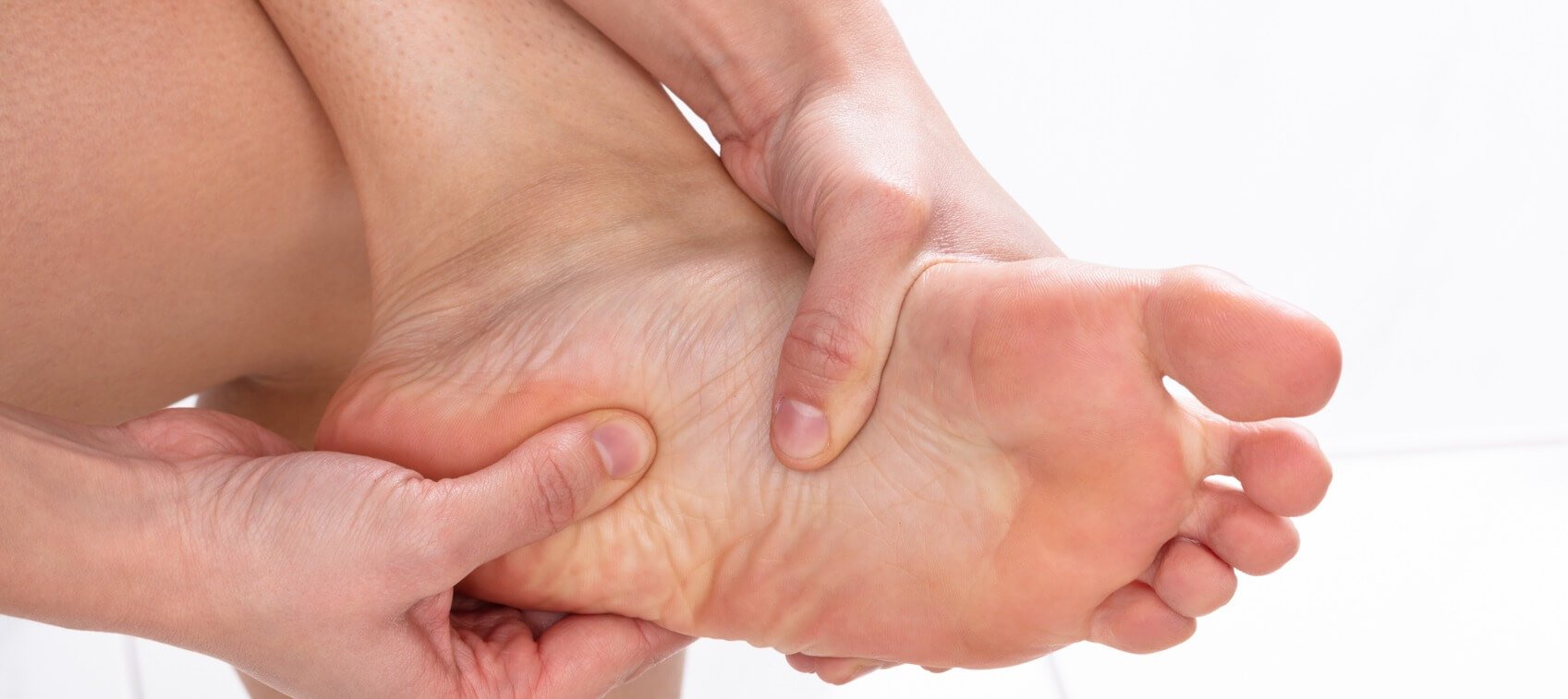
Is nerve pain in the feet stopping you from doing the activities you love? Is it affecting your daily activities and the quality of your life?
Have you already tried many things and want to try home remedies for nerve pain?
If so, you are on the right page.
This article talks about why you may have nerve pain, and what you can do to find relief. So, let's dive in!
Causes of Nerve Pain in the Feet
Nerve pain is mainly due to nerve damage or neuropathy, which is a prevalent condition affecting 10% of the population worldwide. When this affects the nerves of hands and feet, it is known as peripheral neuropathy.
In addition to pain, you may also have a burning or tingling sensation, loss of balance, muscular weakness, and sexual dysfunction.
The nerve pain in your feet can vary in intensity depending on the underlying cause.
Diabetes
Diabetes is a chronic metabolic disorder where your blood sugar levels are high. If left unattended, the high sugar content of your blood can damage the nerves and blood vessels. This condition is known as diabetic neuropathy.
About 50% of the people with diabetes will have neuropathy at some point in time.
Small Fiber Sensory Neuropathy
This condition affects your small cutaneous nerves that send sensory signals between the skin and brain. It may cause pain or discomfort in your hands and feet.
Small fiber sensory neuropathy is mainly linked to abnormal glucose metabolism or diabetes.
It may result in tingling, cold-like pain, or the sensation of pins and needles.
Excess Alcohol Intake
Long-term and heavy use of alcohol may result in alcoholic neuropathy, damaging the nerves of your body.
Charcot-Marie-Tooth Disease (CMT)
CMT damages your peripheral nerves, and its effects usually begin in the lower legs and feet.
Symptoms may include a burning sensation in the feet, foot deformities, weakness of the lower leg and foot muscles, and difficulty lifting the foot.
It is one of the most prevalent inherited nerve problems in the United States.
Complex Regional Pain Syndrome
Complex regional pain syndrome is an umbrella term for disorders involving pain and inflammation following an injury to your leg or arm. Common causes are surgery, fracture, and sprains.
Symptoms of complex regional pain syndrome are burning pain, excess bone growth, swelling of the affected feet, and changes in skin texture.
Tarsal Tunnel Syndrome
This condition is similar to carpal tunnel syndrome, only it affects the ankle instead of the wrist.
The common cause of tarsal tunnel syndrome is damage and compression of the nerve supplying inside the foot and ankle.
It may cause pain, burning, or tingling sensation in your feet.
Other Causes
Common conditions that may cause nerve pain in your feet are:
- Hypothyroidism
- Kidney disorders
- Malnutrition
- Chemotherapy
- HIV or AIDS
- Autoimmune disorders such as lupus and rheumatoid arthritis
- Medications such as anticonvulsants, antihypertensives, and antibiotics.
Home Remedies for Nerve Pain in the Feet
Your doctor will treat nerve pain by managing the underlying conditions. Some common treatment options include:
- Thyroid supplements
- Antifungals
- Medicines to manage pain
- Magnetic therapy
- Electrical nerve stimulation
- Light or laser therapy
There are also various remedies you can try at home to manage nerve pain in your feet. Here are a few of them:
Soaking Feet in Cold Water
This is the simplest way to temporarily manage inflammatory pain.
Cold applications calm your nerve endings and make the area numb. This aids in soothing soreness and inflammation. Cold or ice is ideal when the pain is achy and hot.
Once the pain subsides, heat application will improve blood circulation and support the healing of the injury, if present.
Epsom Salt
Epsom salt is a natural substance made of magnesium sulfate. It is a popular home remedy to soothe pain and inflammation.
To use: Add Epsom salt to warm water and insert your feet in the mixture for about 30 minutes.
People with diabetes should soak their feet in Epsom salt only after consulting their doctor as it may damage the foot.
Turmeric Supplements
Curcumin in turmeric has calming and soothing properties. It may also be effective for many nerve disorders.
A study shows that taking curcumin in the early stages of nerve disorders may have a positive effect. It may also aid in preventing the development of chronic neuropathy.
The ideal dose for nerve disorders is 1.5 g a day.
You can take turmeric as a supplement or add it to your food while cooking it, though supplements with more bioavailable forms of turmeric such as Turmacin® will prove much more beneficial.
Fish Oil
Fish oil alleviates inflammation, helping in reducing discomfort and pain. It can be a good option for soothing pain due to damage by diabetes.
Studies propose the use of fish oil to slow the progression of diabetic neuropathy and reverse its symptoms.
You can take fish oil supplements with 0.2 to 2.1 grams of DHA and 0.2 to 5 grams of EPA.
Ginger
Ginger is again an herb with various health benefits.
A study analyzing the effect of Swedish massage with ginger oil suggests it is an effective approach for soothing pain--more effective than traditional Thai massage.
Animal studies may also hint at its effectiveness in alleviating symptoms of diabetic neuropathy.
It is safe to take up to 4 grams of ginger daily. You can take it as a supplement or add it to your diet while cooking foods.
Vitamins
Some vitamin deficiencies may also cause peripheral neuropathy, and taking supplements may help to address the deficiency, and thus address the pain:
- B-complex vitamins: Play a crucial role in protecting your nerves against damage. B9 deficiency may also hamper nerve health. B1, B6, and B12 supplementation may calm your nerves and reduce neuropathic pain. The dose varies from 300 micrograms to 1.2 grams based on the type of vitamin, age, and other factors.
- Vitamin E: A potent antioxidant protecting your body from oxidative stress. It may protect your nerves from inflammation and help with symptoms such as tingling, burning, and pain. You can take about 15to19 mg of vitamin E a day.
- Alpha-lipoic acid: May help manage burning pain due to diabetes. Its effect on chemotherapy-related neuropathy is not known. Studies indicate a dose of 600 mg a day as beneficial.
- Acetyl-l-carnitine (ALC): Can help to soothe pain resulting from chemotherapy. The ideal dose can range between 250 milligrams to 3 grams.
- N-acetylcysteine: An antioxidant that may help calm nerves and reduce pain sensation. Animal studies suggest that it works by blocking chemicals responsible for neuropathic pain. The ideal dose is 600 mg orally twice daily.
- Glutamine: This non-essential amino acid protects your nervous system from damage. It is safe to take 10,000mg of l-glutamine up to twice a day.
Lidocaine
Lidocaine is a local numbing agent and is used by doctors before procedures such as taking blood.
Topical lidocaine in a patch or gel form can help with neuropathic pain.
Foot Massage
Massage enhances blood circulation to a part of your body. You can massage your feet to improve blood supply to the affected area, which may help comfort your pain.
Studies suggest that foot massage can improve the balance, sensation, and range of motion of your foot.
Other Lifestyle Modifications
In addition to the mentioned home remedies, the following changes may help you with nerve pain in the feet.
Dietary Changes
As mentioned before, diabetes is a common cause of peripheral neuropathy. So, dietary changes to manage your blood sugar levels can also help with neuropathy and even prevent it.
A diet low in simple carbohydrates and high in fiber can keep your blood sugar levels within normal ranges. An easy way to get started is to avoid sweets, white bread products, and processed snacks, which are all heavy components of the standard American diet.
The following dietary habits can also help:
- Adding foods rich in antioxidants such as walnuts, blueberries, flaxseed oil, and fatty fish
- High fiber foods such as fruits, vegetables, and nuts
- Limit sodium intake to less than 2,300 milligrams
Exercise
Physical movement improves muscle tone that may help with symptoms of neuropathy, including pain.
Exercise can also combat various health disorders that may result in peripheral neuropathy, such as diabetes. It also aids in managing blood sugar levels, reducing the risk of diabetes-related complications.
Besides, exercise can also reduce the pressure on peripheral blood vessels, preventing the risk of neuropathy.
Quitting Smoking
Smoking damages and narrows your peripheral nerves, increasing the risk of peripheral neuropathy.
Quitting smoking can boost your circulation, comforting your pain.
Relaxation Techniques
Practices such as meditation, breathing, and progressive relaxation may help to alleviate pain from peripheral neuropathy.
Techniques such as tai chi, yoga, and stretching may improve posture and reduce stress, easing the effects of peripheral neuropathy.
Summary
Nerve pain in the feet can be frustrating and challenging to manage. Your doctor may prescribe medications and/or therapies for it, but you can also use home remedies to soothe your pain.
Some common interventions include cold water baths, supplements, and fish oil. Controlling or excluding the underlying cause also helps. For instance, if excess alcohol consumption is the cause, limiting its intake will help prevent the condition from getting worse.
However, it is best to consult your doctor before starting any home remedies, including vitamins. Lifestyle changes, including a healthy diet, quitting smoking, and exercise, may also help. You can try several options and see what suits you the best!


